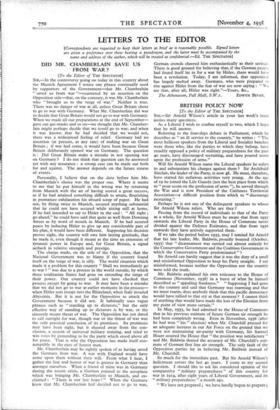DID MR. CHAMBERLAIN SAVE US FROM WAR ?
LETTERS TO THE EDITOR
[Correspondents are requested to keep their letters as brief as is reasonably possible. Signed letters are given a preference over those bearing a pseudonym, and the latter must be accompanied by the name and address of the author, which will be treated as confidential.—Ed. THE SPECTATOR] [To the Editor of THE SPECTATOR] SIR,—In the controversy going on today in this country about the Munich Agreement I notice one phrase continually used by supporters of the Government—that Mr. Chamberlain " saved us from war "—countered by an assertion on the Opposition side—that, on the contrary, it was Mr. Chamberlain who " brought us to the verge of war." Neither is true. There was no danger of war at all, unless Great Britain chose to go to war with Germany. What Mr. Chamberlain did was to decide that Great Britain would not go to war with Germany. When we made all our preparations at the end of September— gave out gas-masks and so on—we thought that Mr. Chamber- lain might perhaps decide that we would go to war, and when it was known that he had decided that we would not, there was a widespread feeling of relief. Germany had no intention (at present, at any rate) of making war on Great Britain ; if war had come, it would have been because Great Britain deliberately opened war on Germany. The question is : Did Great Britain make a mistake in not opening war on Germany ? I do not think that question can be answered yet with any assurance : a strong case can be made out both for and against. The answer depends on the future course of events.
Personally, I believe that on the data before him Mr. Chamberlain's choice was the proper one. Where it seems to me that he put himself in the wrong was by returning from Munich with the air of having scored a great success, as if he had attained something difficult to attain, flourishing in premature exhilaration his absurd scrap of paper. He had not, by flying twice to Munich, secured anything substantial that he could not have secured while sitting still at home. If he had intended to say to Hitler in the end : " All right ; go ahead," he could have said that quite as well from Downing Street as by word of mouth in Munich. If he had secured peace by inducing Hitler to give up any considerable part of his plan, it would have been different. Supposing his decision proves right, the country will owe him lasting gratitude, that he made it, even though it meant at the time an extension of tyrannic power in Europe and, for Great Britain, a signal setback in relative strength and prestige.
The charge made, on the side of the Opposition, that the National Government was to blame if the country found itself on the verge of war, is silly. The world situation which made it a problem for this country " Shall we immediately go to war ? " was due to a process in the world outside, by which three totalitarian States had gone on extending the range of their power. Our country could not have checked that process except by going to war. It may have been a mistake that we did not go to war at earlier moments in the process— when Hitler sent troops into the Rhineland, when Italy invaded Abyssinia. But it is not for the Opposition to attack the Government because it did not. It habitually uses vague phrases such as " standing up to dictators," but the only effective way of standing up to dictators is by war, or the sincerely meant threat of war. The Opposition has not dared to call outright for war, though war or the threat of war was the only practical conclusion of its premisses. Its premisses may have been right, but it sheered away from the con- clusion, a system of universal military training, and tried to win votes by pretending to be the party which stood above all for peace. That is why the Opposition has made itself con- temptible in the eyes of honest men.
Mr. Chamberlain may be rightly spoken of as having saved the Germans from war. A war with England would have come upon them without their will. From what I hear, I gather the fear and horror of war is greater in Germany than amongst ourselves. When a friend of mine was in Germany during the recent crisis, a German pointed to the aeroplane which was bringing Mr. Chamberlain to Munich, and ex- claimed : " There is our last hope ! " When the Germans knew that Mr. Chamberlain had decided not to go to war,
German crowds cheered him enthusiastically as their saviour. There is good ground for believing that, if the German people had found itself let in for a war by Hitler, there would have been a revolution. Today, I am informed, that opposition has largely melted away. Germans, who were prepared to rise against Hitler from the fear of war are now saying : " We see that, after all, Hitler was right."—Yours, &c., The Athenaeum, Pall Mall, S.W.r. EDWYN BEVAN.










































 Previous page
Previous page